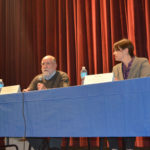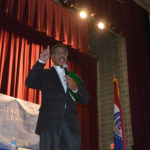
By Paul Thompson
Northeast News
February 8, 2017
KANSAS CITY, Missouri – Americans flocked to international airports throughout the country two weekends ago, in an impromptu protest against an executive action issued Friday, January 27 by President Donald Trump that temporarily restricts travel to the United States from seven majority Muslim countries.
The action, officially entitled ‘Protecting the Nation from Foreign Terrorist Entry into the United States,’ halts the issuance of visas and other immigration benefits for 90 days to “Nationals of Countries of Particular Concern.” The executive order also calls for a wholesale review of the country’s immigration practices, as well as increased vetting of travelers from those seven countries of concern – identified by the Department of Homeland Security as Iraq, Syria, Iran, Somalia, Libya, and Yemen. A 120-day suspension of the refugee resettlement program, as well as a reduction in refugees allowed into the country from 110,000 to 50,000, is another major element of the action.
The order led to partisan rancor throughout the country, as well as lawsuits and countersuits that have continued into this week. Many have weighed in on the controversial issue. In a letter dated February 1, 2017, the Missouri Catholic Conference – represented by four Catholic bishops from throughout the state – penned a statement of opposition against the executive order issued by President Trump.
“The notion that a thriving society would benefit from biased policies and practices based on ignorance, fear and a disordered nationalism corrodes the very essence of our American spirit and impoverishes our democratic life,” reads a passage from the letter. “As citizens of this great land and as members of the Catholic community, we are particularly concerned about our Muslim sisters and brothers whose lives are becoming increasingly difficult and whose safety is being threatened by this recent turn of events in our structures of government and society.”
John Malcolm of the Heritage Foundation, a conservative think tank, was in Kansas City late last week. Ahead of that visit, he issued a statement regarding the executive action, and specifically about President Trump’s decision to fire acting Attorney General Sally Yates on Monday, January 30.
“The President’s executive order is eminently defensible and he is entitled to have an attorney at the Department of Justice defend it in court, especially in the face of several legal challenges,” wrote Malcolm. “Ms. Yates’ decision appeared to be primarily motivated by politics, not law, which, no doubt, prompted the action President Trump took tonight. Fortunately, it seems likely that Jeff Sessions will assume the helm at DOJ shortly.”
Congressman Emanuel Cleaver II responded to the executive action by swiftly organizing a Town Hall on immigration, which drew upwards of 1,000 attendees on Saturday, February 4 at the Manual Career & Technical Center (1215 E. Truman Road). Cleaver gathered a panel of experts to answer questions from those who will be affected by the changes to the refugee and visa program, along with the potential elimination of the Deferred Action for Childhood Arrivals immigration policy, commonly known as DACA.
“The reversal of DACA, in my estimation, sends a very clear signal to people around the world that the United States has become insular,” said Cleaver of the policy, which protects undocumented immigrants who came to America as minors from deportation.
The two-hour town hall touched on a variety of subjects, with guest speakers and attendees alike showing passion throughout the event. Though there was no violence during the town hall, the proceedings were interrupted on several occasions by aggrieved attendees who attempted to shout down the speakers. At one point, a protestor leapt onto the stage and handed a letter to Congressman Cleaver. Cleaver later addressed the letter in remarks to attendees.
“I got a letter asking me to be against Jeff Sessions,” said Cleaver. “I mean, that’s like asking me to be against alligators. Of course I’m going to be against Jeff Sessions.”
Cleaver added that the protestor’s effort was likely in vain, as the House of Representatives doesn’t even get to vote on cabinet appointments. Meanwhile, the protestor had shouted over comments from Illinois Congressman Luis Gutierrez, who had called in on Skype to offer his analysis of the executive order.
Other portions of the town hall were decidedly more constructive. Sarah Baker, a Policy Director with the ACLU, informed the crowd that the organization’s 50 affiliates throughout the state banded together last week to file joint Freedom of Information Act requests with Custom and Border Protection offices throughout the nation, to find out exactly how the executive order has been implemented. Though Baker acknowledged that there had been some legal victories in the fight against the executive action, she warned attendees not to grow complacent.
“We also want you to download our mobile justice app,” said Baker. “As you go out into the streets and protest, as you try to help the immigrant community, or as you are a member of the immigrant community; this will list out your rights when encountering law enforcement and allow you to record incidents and report those directly to the ACLU. We think that is extremely important moving forward.”
On the ground in Northeast Kansas City, refugee resettlement organizations like Della Lamb and Jewish Vocational Services – which rely on federal funding – have been left wondering how to adjust to the new normal. To them, the signing of the executive action means the difference between families being whole, versus fractured; between having funding to continue serving the refugee population of Northeast Kansas City, or not.
Della Lamb had intended to resettle 250 refugees in 2017, after resettling more than 200 in 2016. The federal funding that supports the resettlement program provides $1,125 for each refugee, to pay for housing costs, utilities, groceries, and any other needs that arise as someone makes the adjustment to life in America. Another $800-$900 per individual is set aside for Della Lamb to cover its own administrative costs. While those funds are meant to last for the first 90 days after resettlement, Della Lamb Executive Director Judy McGonigle Akers noted that the funding is rarely enough to cover all expenses.
“It’s bath soap and deodorant and shampoo and toothpaste; all of those kinds of things that we would all take for granted; those are crucial elements when we try to get a person ready for employment,” said Akers. “No one wants to employ a person who walks in without the benefit of those items.”
As a result of the executive action, the organization’s refugee resettlement program will go without funding for the next 120 days, unless legal challenges prove successful. In the meantime, Akers says that Della Lamb will face a $29,000 monthly payroll deficit, which she candidly called “a real 2:00 a.m. nightmare.” The organization had resettled 89 refugees before the executive action, and it still has an obligation, even without additional funding coming in, to provide continuing services to them.
There are ongoing repercussions to consider, as well. Della Lamb was supposed to take in a family of nine Somalians on Thursday, February 2 from a Kenyan refugee camp. The family had spent the previous two months conducting orientation sessions in Nairobi in preparation for a permanent move to America. Those plans were suspended until last Friday, when Seattle judge, James L. Robart legally struck down the travel ban, at least temporarily.
Della Lamb has had three others cases where plans to find refuge in the United States were scuttled by President Trump’s January 27 executive action. According to Akers, explanations on the implications of the order have been hard to come by.
“We haven’t gotten an acceptable explanation for any of it, honestly,” said Akers. “We saw a drafted form of a possible executive order at Tuesday at 2:30 p.m. before the Friday executive order. We immediately jumped on it and sent a two-page ‘Dear President Trump’ letter to please re-think this.”
Akers even set up a Twitter account to disperse the letter to Trump and other politicians throughout Missouri. She defended the perspective of refugees to America, contending that the vast majority are overwhelmingly grateful for the highly coveted opportunity to start afresh.
“Their intentions are all about safety for their family,” said Akers. “The last thing they’re going to do is come over here and try to create even greater chaos; they just came from chaos. They want civilization.”
Kilindo Nalukuli provides one example. A refugee from Congo, Della Lamb resettled Nalukuli along with her mother, father, five siblings, and an uncle six months ago in the Historic Northeast community. Meanwhile, another sister remains back in a refugee camp in Tanzania. Nalukuli spoke during the Feb. 4 town hall, talking passionately about the mindset of a refugee in the wake of the Jan. 27 executive action.
“Who’s going to help the refugees if not for the American government?” Nalukuli wondered. “There is no hope other than the Americans.”
It’s educational to consider the processes already in place to vet refugees coming into the country. The odyssey begins with the U.N. Refugee Agency. That agency collects identifying documents, conducts an initial assessment, and performs biometric iris scans for refugee populations from the Middle East. Applicants are interviewed to confirm refugee status and determine the need for resettlement. Once all of that information is double-checked, potential refugees move on to phase two of the process. Government documents indicate that only 1% of the global refugee population proceeds past this first phase.
Those who pass the initial screening are then received by a federally-funded Refugee Support Center, which again collects identifying documents and compiles a file on the applicant. The RSC then pulls together information for other agencies to conduct a biographic security check in the third phase of the resettlement process. That third phase includes screening from the National Counterterrorism Center, the FBI, the Department of Homeland Security, and the State Department. Those screenings are specifically designed to find security risks, links to bad actors, and outstanding warrants or criminal violations in their home countries. Refugees from Syria – the only country listed on the executive order by name – face an ‘enhanced review’ that could include two more layers of scrutiny by the Department of Homeland Security (DHS). USCIS officers involved in that enhanced review process collect fingerprints and conduct pointed interviews designed to identify any consistencies in the biographical data previously gathered by other agencies.
The fifth phase is a biometric security check, where the fingerprints gathered in phase 4 are screened in the FBI’s biometric database, before being cross-checked in similar databases run by DHS and the U.S. Department of Defense. Candidates then receive medical checks, go through cultural orientation, and are assigned to resettlement locations in the United States. The International Organization for Migration sets up travel arrangements, which ultimately leads to further screening from U.S. customs agents, the Border Protection’s National Targeting Center, and the Transportation Security Administration’s Secure Flight Program.
Once in the United States, refugees are required to apply for a green card within a year of arrival, triggering a final round of security procedures. Finally, after years of work, the refugee is “woven into the rich fabric of American Society.’
With so many checks and balances already in place, Akers believes that the resettlement process is working well. Why, she wonders, does the entire program need to be shut down in order to conduct a review?
“Instead of stopping everything so that you can study it, why don’t you do your own research?” Akers wondered. “Have your people do the research, find out what is happening, and then add on to that if something needs to be done. Don’t stop everything.”




















